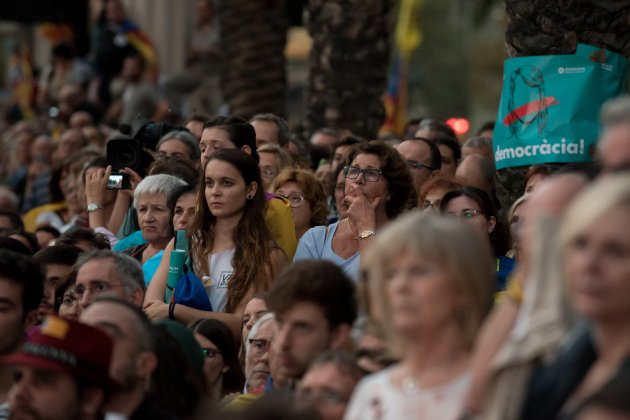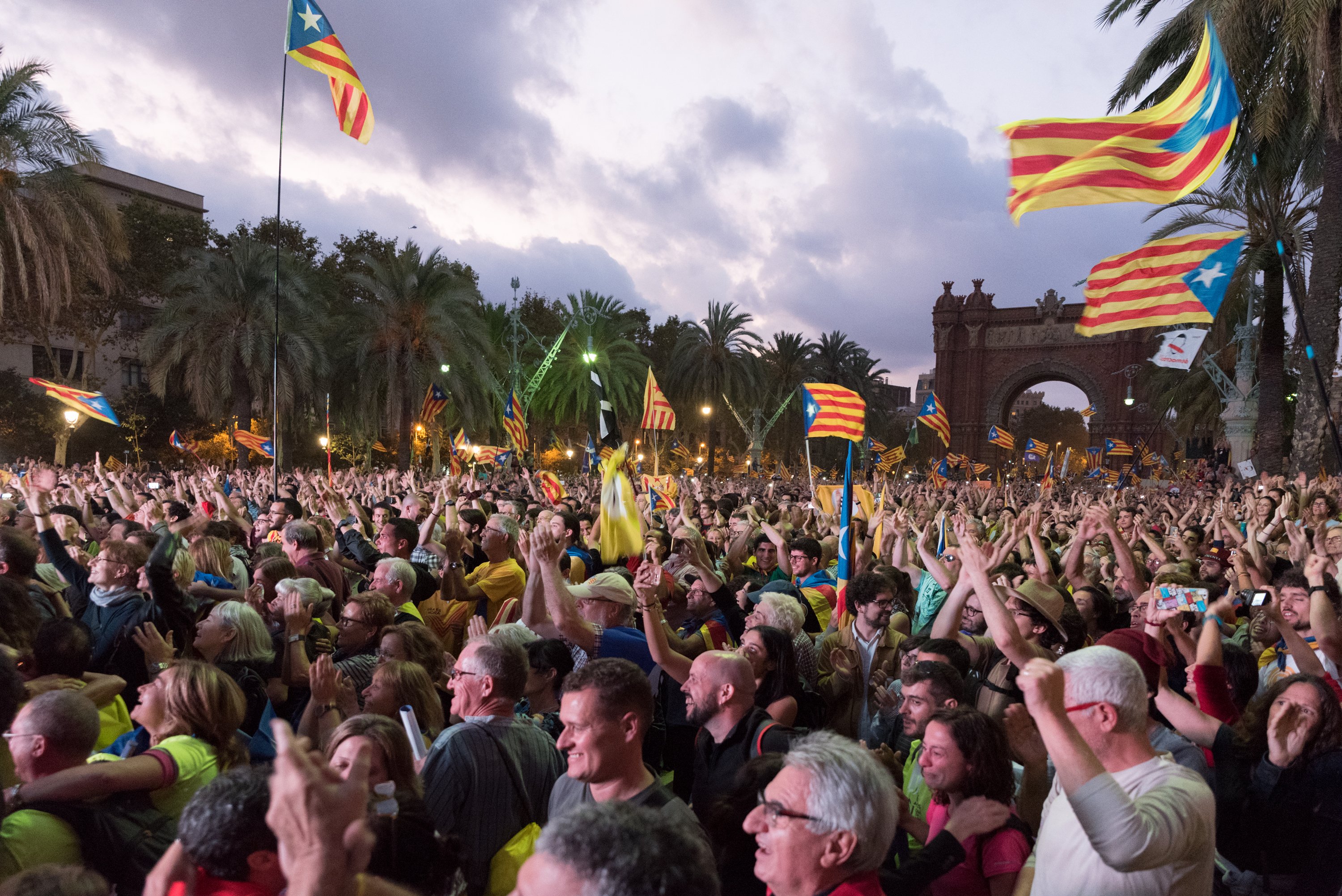Last Tuesday's decision by Catalan president Carles Puigdemont to declare independence and then immediately to suspend its effects generated mixed feelings among pro-independence Catalans. Although many understood it - starting with all Catalan cabinet ministers who gave it their blessing — except for Education minister Clara Ponsatí - many others have not done so. There are indeed those who see it as a lost opportunity which will be difficult to find again.
The Spanish Government, however, has not wasted the opportunity which the move provided. The day after the Catalan declaration was presented, Spanish PM Mariano Rajoy, with the support of opposition leader Pedro Sánchez, sent an ultimatum to Puigdemont, giving him until this Monday to clarify whether he actually did declare independence. The head of the Catalan executive says he will not duck the question and will once more insist on dialogue. The requirement for clarity is the first step set down in the notorious article 155 of the Spanish Constitution, prior to being sent to Spain's Senate for the adoption of the detailed measures considered appropriate in terms of central government intervention in Catalonia.
The first reaction from Puigdemont's left-wing coalition partner the CUP was to demand a maximum deadline of a month for the period of dialogue called, and to announce that they were considering abandoning the Catalan Parliament, suspending their parliamentary activity as long as Catalonia remains in Spain. Some days later, however, after receiving the next door-slam from Madrid, the CUP called for independence to be proclaimed immediately. The leadership of the key pro-independence group ANC along with the left-leaning party Catalonia Democrats also joined in the chorus for the suspension to be lifted.
Beyond the evaluation of the president's strategy itself, the debate on whether to wait or not to wait, to maintain or lift the suspension of the independence declaration, is very much alive in pro-independence circles. There are many nuances, and even more conditions, both internal and external. El Nacional put some of these questions to several key observers.
Sergi Alcàzar
Casassas: “An intelligent and mature decision”
Historian and professor Jordi Casassas considers that president Puigdemont's decision was “very intelligent”, a decision that “demonstrates great political maturity, a very deep sense of democracy and a very significant pro-European consciousness”. He sees it as the best path to take in the face of a state which has “a deficient democratic culture” and acts “with the same mechanisms as in the 17th or 19th century”. This is a factor which must be borne closely in mind, he asserts.
“The mental mechanism of Spanish power, both as an abstraction and in terms of the people who put it into practice, is this: it is founded in a political culture of intransigence”, says Casassas, who says he would not be surprised if the state made use of “political violence, institutional violence and violence-violence”. Spanish repression, he warns, “could make a major qualitative leap in a negative direction”.
In spite of all this, once dialogue has been exhausted, Casassas does not see any other alternative except to make the declaration of independence effective in the next days, that is, this coming week. How the world will react to this independence is still an unknown quantity. “The international community will have to take a stand on a new territorial entity, the Catalan Republic, and on the more-than-probable violent reaction by the forces of the Spanish state”, says the academic. “Catalonia's best asset in this regard is that a significant part of its population has an optimism and a desire to construct something new, which is something quite unusual in the West today”.
Arqué: “The sooner we move ahead, the better”
Anna Arqué, spokesperson for the International Commission of European Citizens (ICEC), understands Carles Puigdemont's strategy. However, the suspension of the declaration offers “more risks than opportunities”, she believes. “The best position to negotiate from is one of keeping the declaration alive”, she states. The decision of the Catalan people in the referendum cannot be subjected to the opinion of third parties. And she quotes Nelson Mandela: “May your choices reflect your hopes, not your fears”.
International pressure should not be allowed to influence the independence movement. This would be to fall into a “trap”, because “all independence attempts receive threats to try and deter them", she justifies. Neither should internal alternatives be admitted. “You cannot say that you will have a binding referendum and afterwards leave it depending on whether the Partido Popular and Spanish Socialist party agree on a constitutional reform or even a negotiated referendum”, argues Arqué. These elements are not the “commitment" that emerged from the ballot boxes on October 1st.
“The sooner we lift the suspension of the independence declaration, the better”, concludes the ICEC spokesperson, who believes that it has to be made effective by applying different short, medium and long-term outlooks. Having a “living” declaration also allows the terms of a possible mediation to be established, she argues: “If your centre of gravity is the referendum mandate, those that want to mediate for an autonomous community will abstain. If not, anybody can step in and say their piece. This would make us lose time or betray the popular mandate received on October 1st”.
Sergi Alcàzar
Costa: “Making visible the intransigence of the Spanish state”
Legal expert Josep Costa assures that it is “too soon” to tell if the suspension of the declaration was an error or not. “The objective is to make visible to the international community that Spain has no intention to end its intransigence. The Catalan unilateral route is based on showing up this intransigence”, points out Costa, political scientist at Barcelona's Universitat Pompeu Fabra. However, he admits that it is possible that the suspension will “have demotivating effects or will unleash a certain disappointment among people who do not understand the strategy”.
The decision has been compared with the Slovenian path to independence in the 1990s, but Costa points out that in the Slovenian case there was “more work to make the negotiation scenario tangible”. He does not believe that this is necessary to pressure the international community, but it should create a different climate: “At the moment when they themselves believed that independence was able to be declared, many different things moved forward. Not making this move reduces the tension and gives Spain the focus”.
At Spanish level, the UPF professor does not believe that anything new will arrive. The constitutional reform announced by the Spanish socialists, which Rajoy did not even refer to, is classified by Costa as “only playing the strategy of confusion”. Once the lack of will for dialogue has been shown up, Costa maintains that the Catalan government has to proceed with what it had planned” and declare its independence in an effective way. In this regard, it would be “reasonable” to set a maximum deadline for this period of suspension.
Torra: “The Spanish state and the European Commission have already spoken”
Even though he signed the proclamacio.cat manifesto in favour of moving forward, and was himself part of the Barcelona crowd awaiting independence last Tuesday, editor Quim Torra understood the decision of president Puigdemont. “I realized that there could still have been the possibility of making a last appeal to the international community”, he assures. However, speaking a few days later, he has come to the view that nothing has changed: “The Spanish state, as well as the European Commission, have already spoken”, he sums up, referring to the positionings of Mariano Rajoy and Jean-Claude Juncker.
More than an error, Torra sees a lack of transparency in the strategy adopted: “The people do not understand that these decisions can be taken on behalf of groups of people who are in the shadows. We spend years arguing the way we should proceed and, all at once, there is a swerve that upsets everything”. In this regard, he insists that, once everybody has shown the cards they hold, what's required is "to keep going straight head along the route we have marked”.
“I would say that president Puigdemont has to reply to Rajoy's demand with the broad lines of last Tuesday's speech: that a referendum was held, validated by a referendum law, which then in its article 4 says what it says - [that the result is binding]”, asserts the editor and ex-president of the Òmnium Cultural organization. “This does not mean that we renounce mediation. We always have to appeal to the international community, but we have to do so with the declaration of independence on the table”.

Laura Gómez
Colomines: “Head for our destination, with the least possible damage”
The historian Agustí Colomines is very clear on what Carles Puigdemont did last Tuesday: “Nobody suspends the effects of something which has not been proclaimed. To suspend, you first have to proclaim”. The problem, however, is that this was not explained well. “He did not know how to explain the reasons. He spoke about dialogue without specifying what dialogue he was referring to, or if there were any international contacts”, he states.
Colomines, director of Catalonia's School of Public Administration refuses to speak about errors: “The Spaniards never talk about errors they have made. Here we are very delicate about these things”. He justifies that this has happened because “this is all about politics and it affects people”. Colomines defends that the Catalan government “is attempting to reach its destination safely with the least damage possible”.
They could have applied 155 already and they have not yet done so. Something must have happened in the meantime”, he asserts. However, he assures that in the next few days, a decision will have to be taken. Monday will be key, he says, with three key Catalan leaders - Mossos head Josep Lluís Trapero, along with the ANC's Jordi Sànchez and Omnium's Jordi Cuixart - appearing in court in Madrid on sedition charges. “If these three are imprisoned, it is clear what our answer has to be”, concludes Colomines.

